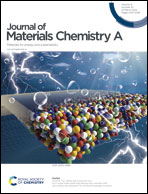Water-chain mediated proton conductivity in mechanically flexible redox-active organic single crystals†
Abstract
Investigating electrochemical features of proton-conducting organic crystalline materials is relevant in developing efficient energy storage and conversion devices. However, the poor structural flexibility of the crystalline materials at the molecular level often impedes hydrogen bond reorganization of the proton carriers during proton migration, ultimately leading to low ionic conductivity. Here, we report crystals of azobenzene, functionalized with dipicolylamine at both ends (Azo-DPA), which contain an extended hydrogen-bonding network with water molecules in its structure. Interestingly, the crystals display remarkable mechanical flexibility explicitly probed by the nanoindentation technique. The mechanically flexible neutral organic crystals devoid of any acidic moieties (–COOH, –PO3H2, etc.) within the system, exhibit promising proton conductivity (1.63 × 10−4 S cm−1 at 30 °C under 95% relative humidity) which is almost 100 times better compared to the neutral organic systems reported to date. Mechanically flexible redox-active crystalline organic material (Azo-DPA) capable of impressive proton conduction was employed as an electrode material for the first time in an aqueous battery containing Zn2+ ions. The experimental and theoretical studies on the charge storage mechanism revealed the redox activity of the azo (–N![[double bond, length as m-dash]](https://www.rsc.org/images/entities/char_e001.gif) N–) centers involving reversible insertion/extraction of protons and Zn2+ ions. Ultimately, the electrode displayed a specific capacity ∼49 mA h g−1 with almost 100% retention after 1400 cycles, encouraging the scope of redox-active organic crystalline materials for energy storage applications.
N–) centers involving reversible insertion/extraction of protons and Zn2+ ions. Ultimately, the electrode displayed a specific capacity ∼49 mA h g−1 with almost 100% retention after 1400 cycles, encouraging the scope of redox-active organic crystalline materials for energy storage applications.



 Please wait while we load your content...
Please wait while we load your content...